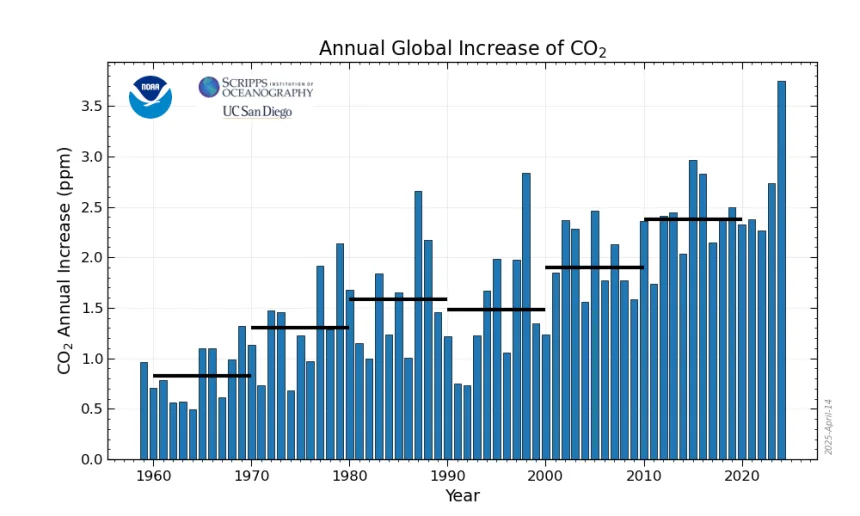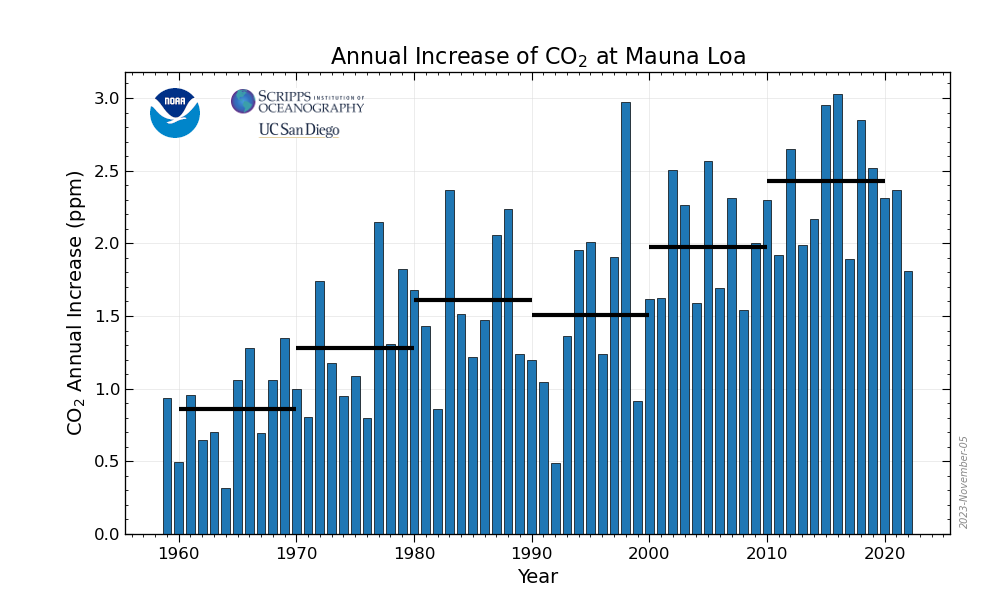Close date updated to 2025-01-01 12:00 am
People are also trading
2024 increase YOY was an unprecedented 3.77 ppm
https://gml.noaa.gov/webdata/ccgg/trends/co2/co2_gr_gl.txt
This is > 3 std. deviations from the mean.

I am likely going to lose some mana 😭
explanation for the record high 2024 rise is given as a reduction of the land sink from El Niño conditions
That 2.3 ppm rise estimate would put it at 425.1 ppm in the NOAA dataset.
https://essd.copernicus.org/preprints/essd-2025-659/essd-2025-659.pdf#page133
Figure 11 (a,b) linked above has the spatial land sink anomaly charts (one from dynamic global models, and one from a mix of Bayesian methods using satellite derived data)
See 3.7.3 (linked below) for the land use sink discussion for 2024: https://essd.copernicus.org/preprints/essd-2025-659/essd-2025-659.pdf#page46
~
I note their Nov 2024 preprint for the 2024 forecast only had a 2.7 ppm increase for 2024 (so I’m not going to overly blame my prediction as being awful if this resolves yes)…
https://essd.copernicus.org/preprints/essd-2024-519/essd-2024-519.pdf
Relevant news that might affect (in the future) part of the data used for resolution...
https://bsky.app/profile/byscottdance.com/post/3lkea5rxrts2g
"The observatory itself is not on the list of potential closures, but staff in the Hilo lab work to maintain it, according to the lab’s website."
I don't know how they are going to maintain the equipment if the lab closes though?
I am assuming that it is global yearly average as done in, https://gml.noaa.gov/webdata/ccgg/trends/co2/co2_annmean_gl.txt
as there is a lot of variation from both seasons and the different observatories.
Based on annual trend data from:
https://gml.noaa.gov/webdata/ccgg/trends/co2/co2_gr_gl.txt
and the 2022 avg. of 417.06 from the first data set, it would have to increase by an annual average of about 2.65ppm per year for three years to exceed 425. Based on the trend data, I find this unlikely, so I am betting No. If the market description changes dor becomes more specific, I will update. Edit: I fixed my calculation to more decimal places (too much app crashing), it makes it much closer as looking at the last decade annual increase where it was about 2.4ppm, with an upward trend - eyeballing this at 2.5 is where I would put my prediction as the decadal mean for annual increase for 2020-2030, but 2.65 is not unreasonable. As of now I would bet it being about 424.56 ppm in 2025 (3*2.5 + 417.06).
@parhizj Yes daily weekly and monthly numbers are certain to exceed 425 in 2025 whereas annual average looks to be sensible.

a bit of a bounce back from low increase in 2022 seems likely.
@parhizj Yes, that was my intention. I think global yearly average makes most sense in terms of influence on global climate and NOAA seems like a decent source for resolution.
Updating from 2024 mean using https://gml.noaa.gov/webdata/ccgg/trends/co2/co2_annmean_gl.txt:
2022 417.07 0.07
2023 419.31 0.15This is an increase of 2.24ppm (+-0.22) from 2022 to 2023. (from 2.02 to 2.46 ppm if adding the uncertainties).
This is rate of increase is, as expected, still below what is needed to exceed 425ppm for the 2025 global mean. Without calculating probabilities this question should be below 50% then, so I am increasing my NO bet as such.
data source? is resolution based on daily co2 reading at ANY point during 2025 or mean atmospheric concentration during the year? shouldn't the market close 01-01-2026?
@lumi Undecided on data source, but other commenters point to NOAA as a good option. The intent of the question was to get at the drivers of global climate change, for which global mean during the year seems most relevant. I'm not that interested in local or seasonal fluctuations.
@lumi I set the close date at the start of the year since I don't want traders to be discouraged from buying if they don't think they will be around to react quickly to any announcements of measurements that would cause resolution in the year.
@RobinFoster Closed is the same as being 'open but resolutely refusing to bet any more'. You can choose to do latter if you wish if it is left open. The differences are you cannot cash in your holding, nor choose to bet during last year if it is closed. These both seem disadvantages
To explain a little further: To avoid a more active person taking advantage of you when announcements come out, you should not leave open book orders at these times. It is quite possible to do this if the market is left open, just don't leave open book orders.
@ChristopherRandles Hmm, yes. This makes sense. I guess I was thinking by analogy with sports matches where I'd rather not bet on an exchange where someone else watching the match can react to that information faster than me, who is busy doing other things. But if no-one can react to information (the market is closed) that doesn't actually matter.
Other comments welcome! Would other traders prefer this market to close at the end of 2025 or do you prefer the end 2024 close?